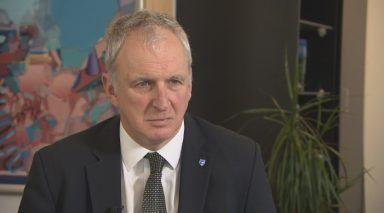Scottish ministers have been urged to rebuild a potentially lifesaving aneurysm screening programme after figures revealed invitations for tests fell by a fifth on pre-pandemic years.
The Abdominal Aortic Aneurysm (AAA) programme invites men aged 65 and over to be tested for the potentially fatal condition.
However, the programme was paused in March 2020 due to the Covid-19 pandemic, and while it has resumed, has failed to meet pre-pandemic numbers.
Scottish Liberal Democrat leader Alex Cole-Hamilton said the fall in screenings was “disappointing” due to the lifesaving nature of the tests.
In the pre-pandemic year ending March 2020, 97.4% of men were invited for screening before their 66th birthday, Public Health Scotland figures showed.
But in the same 2023 period, just 75.1% of men in the age group were invited to be tested.
Similarly, 70.7% of eligible men were tested before they were aged 66 and three months, compared with 82.8% before the pandemic.
The figures also showed that just 19% of men deemed appropriate for AAA repair surgery were operated on within eight weeks in the year ending March 2023, down from 50.6% in 2020.
The tests assess whether men have large aneurysms which, while uncommon, can be deadly if undetected.
Those found to have small aneurysms are invited to have regular screenings.
Mr Cole-Hamilton said: “Detecting dangerous aneurysms can be lifesaving so it is disappointing to see that the proportion of men being screened has fallen so dramatically.
“It used to be that virtually everyone was invited for screening on time but now the target is missed for more than a quarter.
“Where a potentially fatal problem is detected it is taking far too long to get these men the surgery they need.
“The Government must rebuild this key programme.
“Far from recovering post-pandemic, things have actually got worse.
“This is yet another part of the NHS which is declining under the SNP.
“I am yet to meet a medic or patient who believes that Humza Yousaf’s so-called NHS Recovery Plan is enough to get our national health service back to where it should be.
“The country is being left with burned out staff and patients who feel as if they have been abandoned.”
A Scottish Government spokesman said: “These statistics reflect the hard work required to recover vascular services from the significant impacts of Covid and the catch up exercise necessitated by the 2020 pause to screening.
“As part of the recovery exercise, some individuals received their invitation later than they ordinarily might have. However, performance is regularly monitored, and the programme is recovering well.
“It is welcome news that the inequality gap in coverage has reduced, however we recognise more work is required – which is why we published a strategy last year to ensure equity in access for all eligible people in screening services.”
Follow STV News on WhatsApp
Scan the QR code on your mobile device for all the latest news from around the country



























